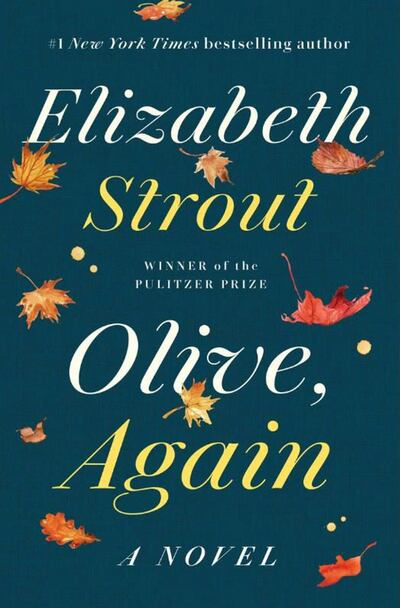It's been 11 years since Elizabeth Strout's Pulitzer Prize-winning Olive Kitteridge was published, after which it was turned into an HBO mini-series starring Frances McDormand as Strout's titular cantankerous "old bag", a retired high school maths teacher in the small town of Crosby, Maine.
Although often categorised as a volume of short stories, it actually offers something more than a traditional collection, because, even though it jumps between the lives of different characters, they're all strung together – some more closely than others – by Olive's presence. In certain chapters she takes centre stage, in others she's only mentioned in passing, but as the reader makes their way through the book, their understanding of Olive – including her flaws and frailties – deepens. To describe the work as a series of interconnected stories goes some way to recognising how the text functions, but it still doesn't quite do justice to Strout's portrait of this one woman and the community she's touched.
The news that Strout was writing a sequel was music to the ears of readers who fell in love with Olive the first time round, especially as she published both My Name is Lucy Barton and its follow-up Anything is Possible, to rapturous praise in the intervening years.
Following exactly the same structure Strout so successfully employed in Olive Kitteridge, the sequel is also split into 13 chapters. More obvious attention is devoted to Olive than in the first book, in which she doesn't become the main protagonist until the fourth story. In Olive, Again, it only takes until the second chapter, though she also plays an important role in the first, so it's clear we're very much following her from the beginning.
The narrative thus drifts in and out of Olive's life by means of both her story and that of others in her orbit, many of whom we've already met. Indeed, the book is actually something of an Easter egg hunt for dedicated readers of Strout's work.
Not only do certain characters from Olive Kitteridge reappear – including Olive's second husband, Jack Kennison, a retired Harvard professor and widower with whom Olive embarked on an unexpected romance at the close of the earlier volume, plus Olive's middle-aged son Christopher, his wife Ann and their children – but in a rather delightful example of complex literary Venn diagramming, Strout also reintroduces protagonists from two of her other novels: the titular daughter and mother duo from her debut, Amy and Isabelle, as well as the central players from The Burgess Boys, the book she wrote after Olive Kitteridge.
For one book to contain such multitudes – with each chapter a new life, or lives, unspools – is impressive. Yet, despite the deep sense of comfort felt at being back in the familiar world of a master storyteller, there is something about Olive, Again that leaves the reader feeling unsettled. What felt fresh and stylistically innovative a decade ago didn't carry quite the same weight the second time around. Due to the nature of its subject matter, Olive, Again takes us to more depressing places.
While Olive Kitteridge was a portrait of a life, Olive, Again is a depiction of the darkness that closes in towards the end. "She was trapped," we're told of Olive, "and her vision of the world had become smaller."
With little to look forward to now, all Olive has is the life she’s already lived, which “swelled behind her like a sardine fishing net, all sorts of useless seaweed and broken bits of shells and the tiny, shining fish”.
Olive, as ever, is without sentiment. "We're all just a few steps behind you," she tells a neighbour with cancer, a woman who's angry she's dying. "Twenty minutes behind you and that's the truth."
This is a book steeped in grief and loss; bodies litter the pages. It's also a book about that great, epic subject that Strout tackled so tenderly in My Name is Lucy Barton: loneliness. "My soul is aching," thinks another character. "And it came to him then that it should never be taken lightly, the essential loneliness of people, that the choices they made to keep themselves from that gaping darkness were choices that required respect."
Here, loneliness is presented as an inevitable consequence of getting old, along with the loss of people you love and the things that shored up your identity, not to mention the control of basic bodily functions. To try to claim such portrayals don't make for sombre reading would be disingenuous, but the candour with which Strout attacks her subject is also oddly stirring.
As ever, her prose is peppered with perfect descriptions: the woman who "looked like a melted candle"; Olive's feeling, when she's in the ICU with pneumonia and drifting in and out of consciousness, that "she was a huge chunk of smelly cheese and every so often someone seemed to mop her up"; or the woman who carries her murderous brother's story "carved into her deeply; it sat quietly tucked deep beneath her rib cage all the time".
After she's the awkward witness to her son's wife yelling at him during a visit they pay to Olive's home, the older woman thinks "these were openings into the darkness of a relationship one saw by mistake, as if inside a dark barn, the door had been momentarily blown off and one saw things not meant to be seen". Olive, Again is a series of portholes into this darkness. To peer inside too closely seems invasive, but to look away seems somehow equally disrespectful: this is also a story of bearing witness to the everyday, ordinary suffering all around us, be it our own or that of other people.
As one unhappy Trump supporter tells Olive (a Democrat) when the latter tries to bridge the void between them by asking about the other woman’s life: “Oh, it’s just a life, Olive.”


